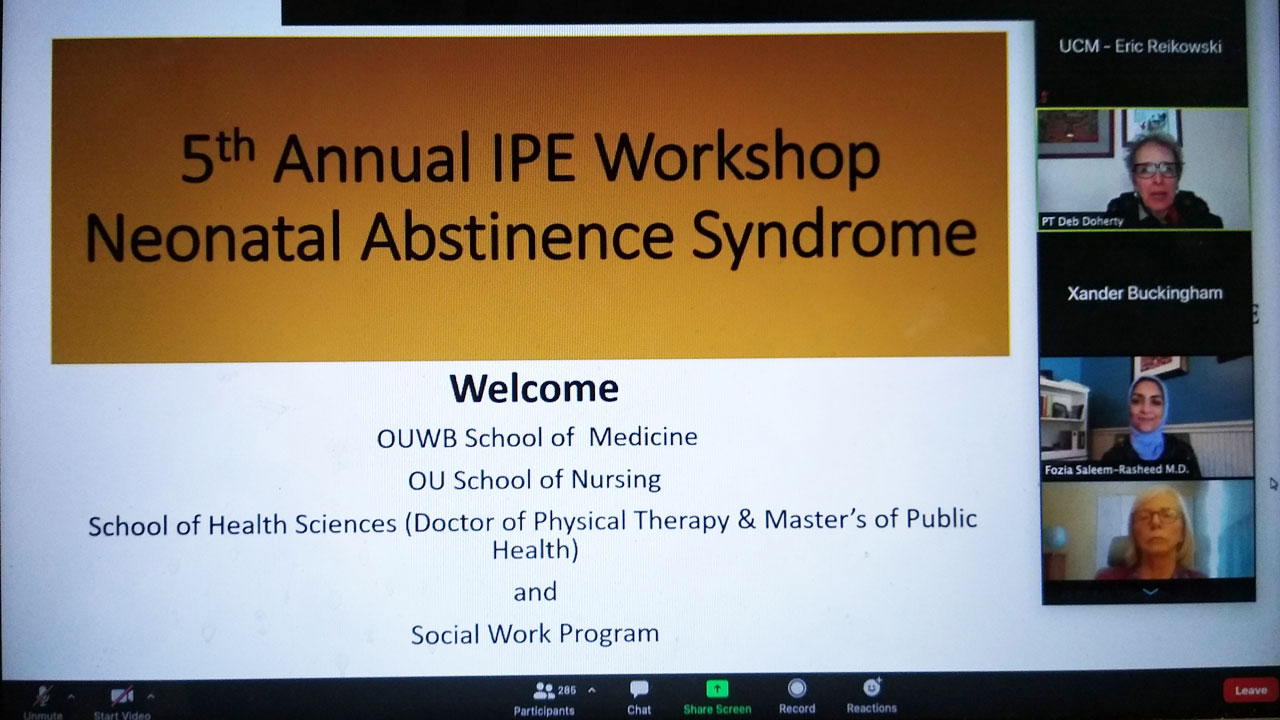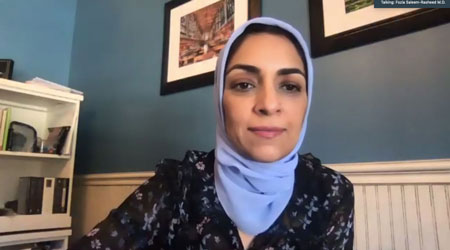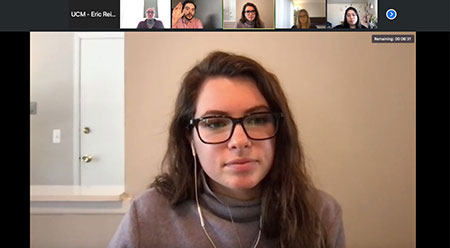OU students learn about Neonatal Abstinence Syndrome at annual workshop
Conducted virtually, OU's fifth annual Interprofessional Education Workshop focused on Neonatal Abstinence Syndrome, a condition caused when babies are exposed to opioids in the womb.

Nearly 300 students from a variety of health-oriented academic programs recently took part in Oakland University’s fifth annual Interprofessional Education Workshop on opioid abuse. Although this year’s event was held virtually due to the coronavirus pandemic, it featured plenty of insights into the challenges and opportunities health professionals have to deliver the highest quality of patient care.
This year’s event was focused on Neonatal Abstinence Syndrome (NAS), a withdrawal syndrome that can occur in newborns exposed to certain substances, including opioids, during pregnancy. NAS develops in about 50-80% of all newborns exposed to narcotics in utero and is characterized by the withdrawal symptoms (high-pitched cry, irritability, tremors, jitteriness etc.) that occur as the drugs gradually clear from the baby’s system.
“Each year, we try to find a component of the opioid crisis that also allows us to demonstrate the need for interprofessional collaboration,” said Deb Doherty, associate professor and chair of the Human Movement Science Department and the Interprofessional Education Task Force at OU. “NAS truly embodies the need for interprofessional collaboration. Our students in medicine, nursing, physical therapy, social work and public health are equally essential to the treatment of a child with NAS and their family.
Fozia Saleem-Rasheed, M.D., board-certified neonatologist at Beaumont Children's Hospital, was the keynote speaker at this year's Interprofessional Education Workshop. |
The event was keynoted by Fozia Saleem-Rasheed, M.D., a board-certified neonatologist at Beaumont Children’s Hospital. She shared her experiences caring for babies with NAS and also highlighted roles and responsibilities of care team members in supporting those affected by the condition.
“It takes a multidisciplinary team to make sure the needs of each neonate and parent are addressed,” Dr. Saleem-Rasheed said. “The mainstay of treatment is optimizing nonpharmacological interventions and the multidisciplinary team is key in doing that.”
The care team includes neonatologists, residents, nurse practitioners, nurses and nursing managers, social workers, pharmacists and physical therapists. Each specialty contributes to the care plan, which involves not only medical interventions, but psychosocial support as well.
“There’s always a history for why parents are on opioids,” Dr. Saleem-Rasheed said. “It’s a complex history that we need to recognize. Parents often feel a lot of anxiety, shame and guilt, and also a fear of being judged by the medical team or other family members.”
She added that it’s important to be able to “withhold judgment and have compassion” for patients and family members regardless of their personal circumstances and empower them to be a part of the baby’s care.
Participants discussed a case study during the workshop. |
Following the keynote, students gathered in small teams to discuss a case study involving an infant and mother dealing with NAS and related issues. Each group was led by a faculty facilitator and a student facilitator who helped guide the discussion.
Later, the case study was discussed by a panel of health professionals who highlighted multi-disciplinary intervention options to limit the use of prescription opioids. The panel was moderated by Stephen Loftus, Ph.D., OUWB associate professor of medical education and included five health professionals:
- Kristen Brown, LLMSW, Clinical Social Worker
- Veena Rajanna, MS, PharmD, BCPS, BCPPS, Clinical Pharmacy Specialist
- Robin Blalock, MPT, Physical Therapist
- Amy Gaither, RN
- Halli Rennaker, BS, Project Coordinator, Michigan Public Health Institute
Here’s what students had to say about this year’s Interprofessional Education Workshop:
“The value of interprofessional collaboration in health care is more important now than it has been in the last 25 years that I have been working in this field. Our professions have become so specialized and great strides are being made to ensure patients are receiving the best possible care. But unless we have continuous communication with all disciplines valued equally, the continuity of care will suffer and patients will suffer. Interdisciplinary teams that foster open communication among caregivers and patients are a recipe for success.”
-Tracy Hack, Doctor of Philosophy in Nursing, School of Nursing
“I think there is overwhelming value in interprofessional collaboration in health care, and it truly centers on the communication and varying focuses of each member of the health care team. Each member of the team has a specific role to play that is essential in delivering the very best patient-centered care possible. We see people on some of the worst days of their lives, and if we work as a team in a collaborative way we can try to make that day a little less stressful by ensuring they are covered on every aspect of their care and well-being.”
-Eric James, M2, Oakland University William Beaumont School of Medicine
“Before starting my master’s program, I was the resident farmer of Henry Ford West Bloomfield Hospital for six years managing a farmers market and preventative health programs. The lack of interconnection in the health sciences is only recently gaining attention, which is disheartening and unfortunately not new to me. Acknowledging the gap is the first step towards closing it. I enjoyed being a facilitator for the event because it gave me the opportunity to engage with my peers to synthesize better health outcomes than a single paradigm could ever hope to achieve.”
-Trevor Johnson, Master of Public Health, School of Health Sciences
“I think it is common in health care that we often understand our own discipline very well, but we do not always understand the roles of others, which stresses the importance of participating in interprofessional education. This event opened my eyes to the roles of the health care team with neonates, including doctors, nurses, social workers, pharmacists, public health workers and physical therapists, and I now understand what each of these providers do to enhance the care of the neonate and additionally the mother and family.”
-Alyssa Logie, Doctor of Physical Therapy, School of Health Sciences
“I believe that the value of interprofessional collaboration is that it helps the treatment team understand each other’s specialty and how we play a role in the treatment and care of our patients. Oftentimes we have questions about the medical condition, or the psychological diagnosis, or the social factors, and it is great to know that through Interprofessional work we have resources available to help answer questions and identify knowledge-based solutions to treat the holistic biopsychosocial conditions of our patients.”
-Sean Mason, Bachelor of Social Work, College of Arts and Sciences
After the workshop, a virtual naloxone training was provided by Kathleen Spencer, DNP, RN, MA, ACNS-BC, special instructor in Oakland University’s School of Nursing. Naloxone, commonly known as Narcan, is a medication used to reverse opioid overdoses. Those who attended the training were taught how to recognize the signs of an opioid overdose and safely administer an intranasal naloxone dose.
This year’s workshop was organized by the Oakland University Interprofessional Education Task Force, which consists of faculty from the School of Health Sciences (Masters of Public Health and Doctor of Physical Therapy programs), School of Nursing, Oakland University William Beaumont School of Medicine and College of Arts and Sciences (Social Work Program). Funding and support for the workshop were provided by the School of Health Sciences and Oakland University William Beaumont School of Medicine.


 February 12, 2021
February 12, 2021
